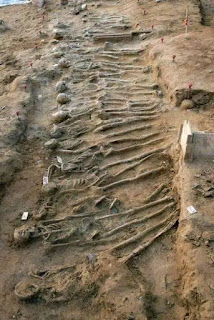The skeletons of the soldiers killed during the Battle of Imera (Palermo) between the Greeks and the Carthage, resulting in the victory of the Greek Siciliotes in 480 BC.
Greeks attack the land camp
Gelo's horsemen left their camp on the night before the appointed day, and at daybreak these horsemen arrived at the Carthaginian sea camp and were admitted into the camp. Greeks spotted them inside the Carthaginian camp from Himera and signaled Gelo. It is not known if the Syracusan army was inside Gelo's camp or had assembled somewhere outside at that time. The Greeks marched around the south end of Himera and moved towards the Carthaginian land camp. Theron and his army stayed put in Himera. The Carthaginian army left their camp and formed up on the hill, forcing the Greeks to fight an uphill battle. The struggle was fierce and long and neither side gained any advantages.
Death of Hamilcar
Sometime after the battle was joined, the disguised Greek horsemen killed Hamilcar while he was preparing the sacrifice, and then set fire to the beached ships, causing great confusion at the sea camp.[35] It is not known what further role the Greek cavalry played in the battle. The Carthaginians rushed to launch whatever ships they could save and some of the ships, overcrowded with soldiers, left the site altogether. When the news of Hamilcar's death and the burning of ships reach the fighting armies, the Greeks pressed harder and routed the Carthaginians, who fled to their camp.
In an alternative version, Gelo ordered Pediarchos, his captain of archers, to "dress as the tyrant" to impersonate him and offer sacrifices in front of the camp. Pediarchos was surrounded by archers who had concealed bows in their dress while he impersonated Gelo. Hamilcar was obliged to come out to offer sacrifices also, and the bowmen shot him down.




Comments
Post a Comment